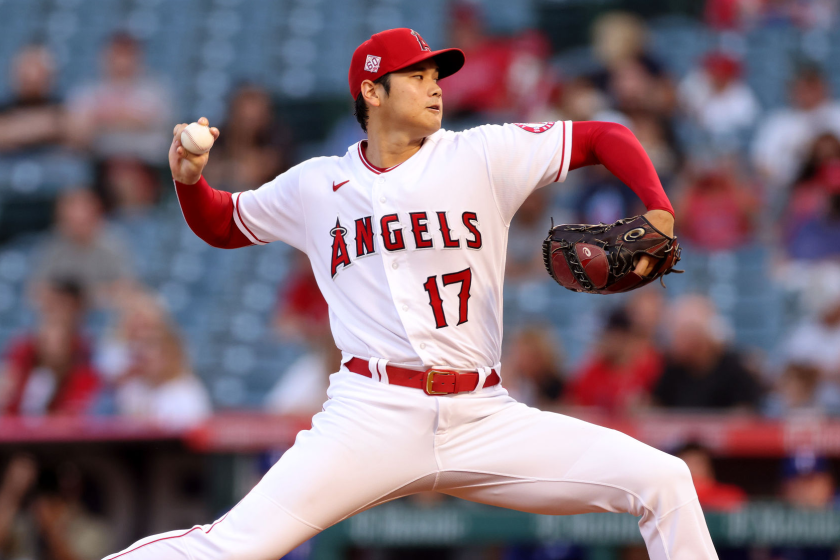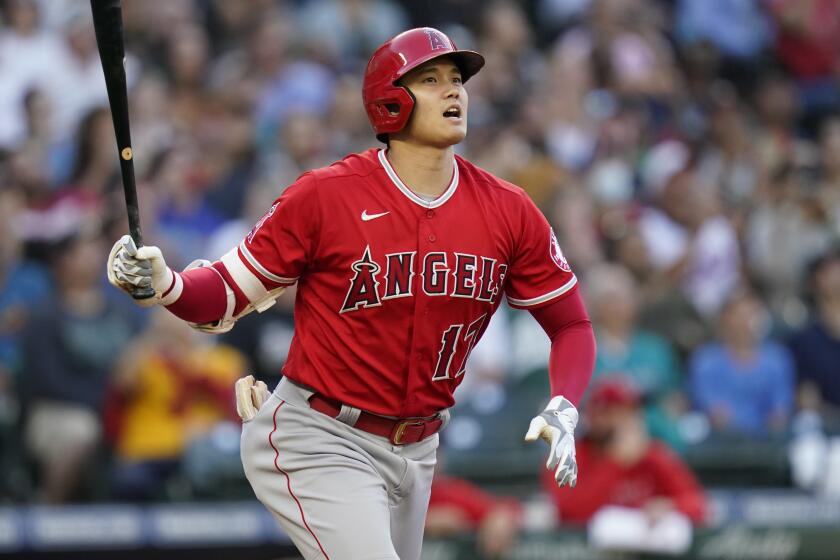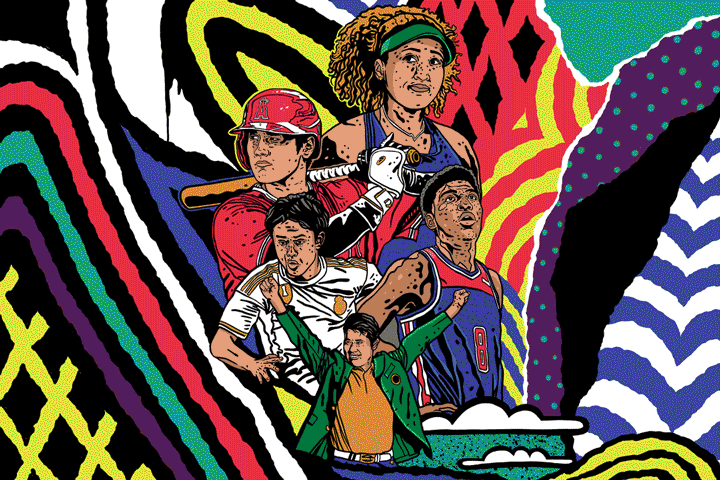Column: Shohei Ohtani realizes goal to be the best. Where do the Angels fit in his future?
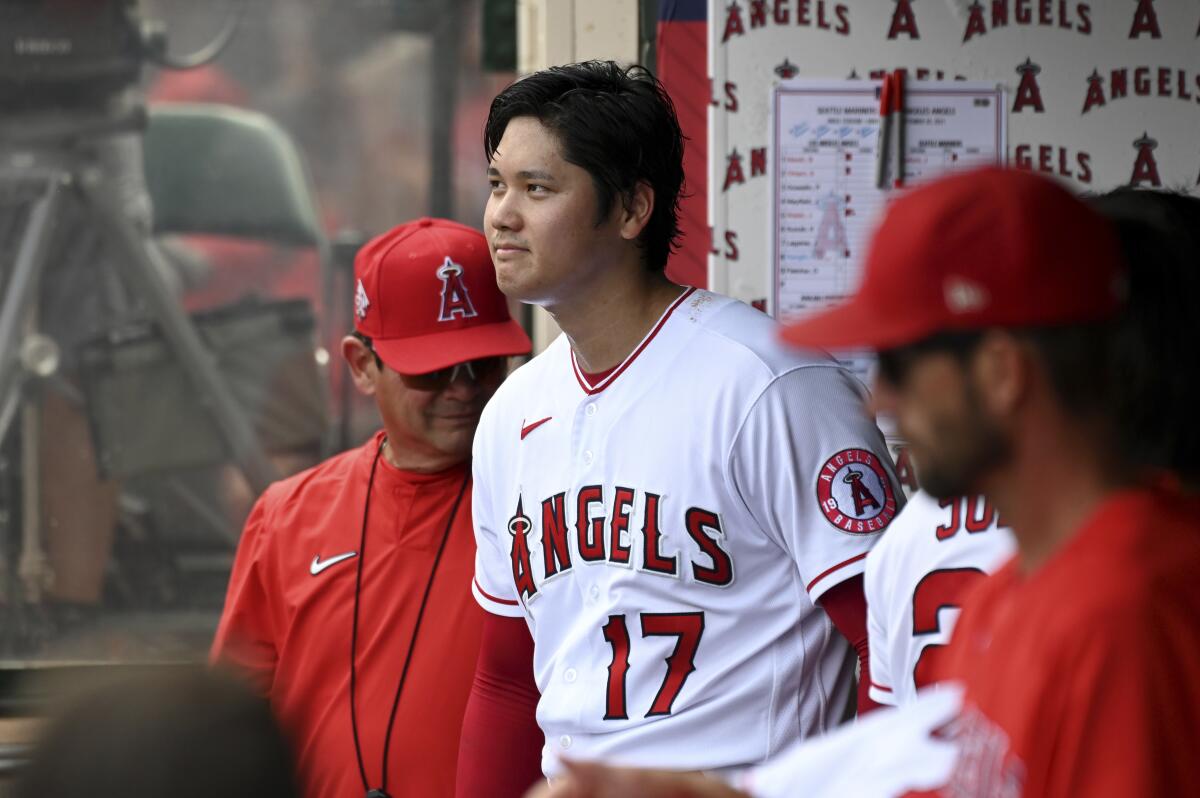
- Share via
Shohei Ohtani nodded as he listened to the question.
“My goal?” he asked in Japanese.
He drew an audible breath and looked down.
“As long as you’re playing baseball, I think it’s natural to want to become the No. 1 player,” he said.
Ohtani continued, “In baseball, it’s hard to measure what makes a player No. 1. That’s the hard part, but I think what’s makes a player the happiest is when fans and other people say, ‘He’s No. 1.’ I would like to do my best to become that kind of player.”
That was four years ago, in a farewell news conference in Tokyo. He hadn’t signed with the Angels yet. He hadn’t even taken meetings with the representatives of major league organizations who wanted to sign him. All he knew was that he was moving overseas to play in the major leagues.
Can Angels pitcher/slugger Shohei Ohtani repeat the incredible two-way numbers that made him the unanimous AL MVP? Those closest to him believe he will.
Ohtani might not have known specifics of the world into which he was about to enter, but he always knew where he was headed.
Today, everyone from casual fans to his fellow players are calling him the best player in the world.
The designation was formalized Thursday, as Ohtani was named the American League’s most valuable player.
He was a unanimous choice for the award, receiving all 30 first-place votes from an electorate consisting of members of the Baseball Writers’ Assn. of America.
As delighted as he was, Ohtani said he didn’t feel as if he realized his ambition of becoming the sport’s No. 1 player.
“I don’t think there will ever come a day when I feel that,” Ohtani said. “It’s more of a general goal. But since there’s no finish line, I think I’ll be able to continue working hard.”
What he did do was win the award in a way he envisioned, as a two-way player.
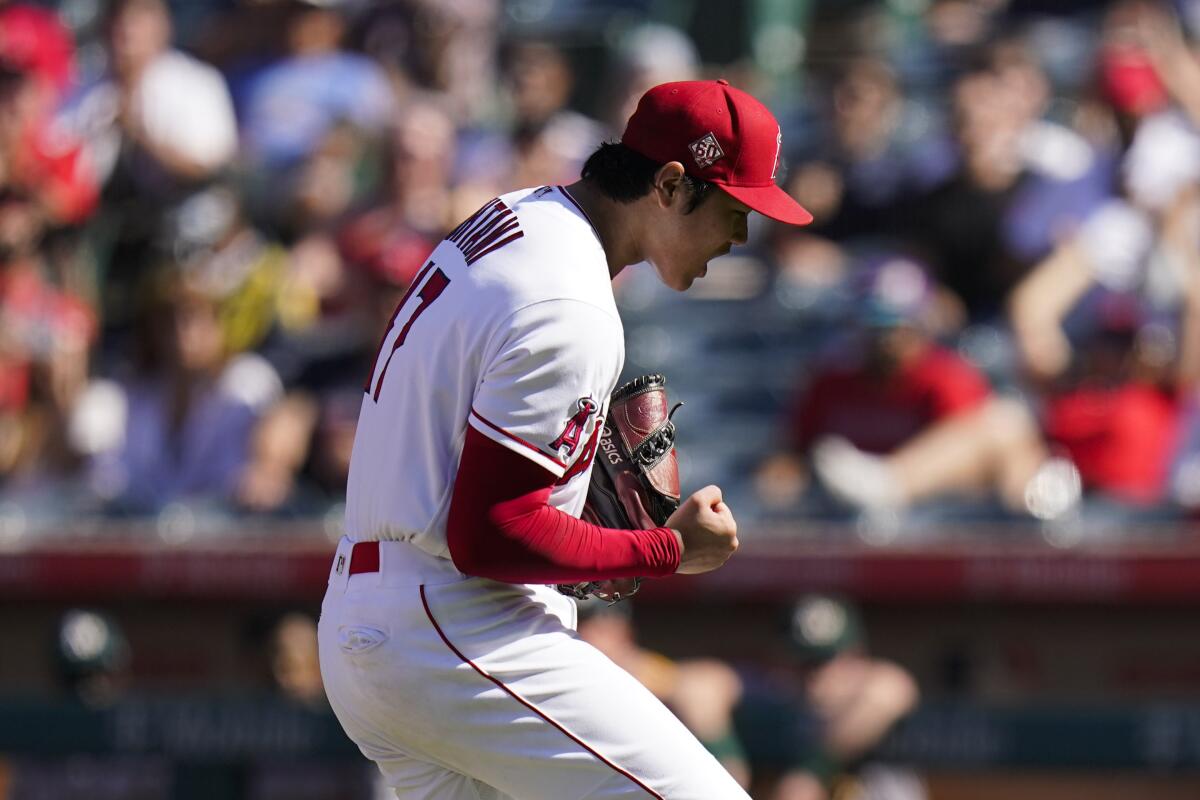
When describing the mindset of his most famous pupil, Ohtani’s high school coach recalled what a Nippon-Ham Fighters executive once said to convince a then-teenage Ohtani to start his professional career in Japan rather than the United States: “Let’s be pioneers and do something no one has done before.”
That’s why when Ohtani was still playing in Japan, Hanamaki Higashi High coach Hiroshi Sasaki predicted he wouldn’t later sign with a signature franchise such as the Dodgers or New York Yankees. Sasaki was right. Ohtani chose the Angels.
Being a two-way player was central to Ohtani’s trailblazing spirit.
The idea of developing Ohtani as both a pitcher and hitter was that of the Fighters. They were criticized for the experiment.
So, when he became Japan’s top player and was ready to move to the major leagues, he said he felt he owed it to the Fighters to remain a two-way player.
Angels star Shohei Ohtani was a top hitter and a strong starting pitcher, delivering a once-in-a generation season that earned him unanimous AL MVP honors.
“There’s a part of me that feels it’s not just mine,” Ohtani said at the time.
Entering his fourth year in the major leagues, Ohtani sensed another resisting force.
When the Angels approached him before the season about eliminating the days off that were previously built into his schedule, Ohtani said he wanted to embrace the added responsibility. But he also said, “There was a feeling that if this didn’t take the right form to a certain degree, it would be necessary to reconsider what I was doing.”
In other words, he thought that if he couldn’t produce as a two-way player, he could be forced to become a full-time hitter. As it was, many people around the game already believed that’s what was best for him, as injuries had limited him to a combined 12 starts in his previous three seasons.
What started as a do-or-die season ultimately became an historic one. His 46 home runs were third in the majors. He was 9-2 with a 3.18 earned-run average as a pitcher.
Asked if he thought his performance was enhanced by the pressure he felt, Ohtani replied, “Hmmm … I wonder.”
He continued, “I’ve never been in an environment that was 100% accepting [of the idea of me being a two-way player] since I became a pro. There’s always been some criticism. I honestly didn’t have any feelings of wanting to prove them wrong. I genuinely just wanted to see how good I could become, and I think it was good that I was able to try my best to find out.”
So, now what?
This is their moment: Shohei Ohtani, Naomi Osaka, Hideki Matsuyama, Naoya Inoue and more Japanese athletes shine in unique ways on the global stage.
In the case of Ohtani, when forecasting his future, it’s always instructive to revisit his past. The clues are there.
At that news conference four years ago at the Japan National Press Club, Ohtani was asked about his desire to win a World Series.
“As someone aiming to be the No. 1 player in the world, I think it’s a place you have to pass through,” Ohtani said. “I also think it’s the ultimate goal in baseball. I would definitely want to experience that.”
He said Thursday that he is fond of the Angels and would like to play for them for a long time. But he has also mentioned a number of times how frustrated he was to play for a non-contender this year. He will be eligible for free agency after two more seasons.
Ohtani knows what he wants for his career. The challenge for the Angels will be to convince him they can help him realize his visions.
More to Read
Go beyond the scoreboard
Get the latest on L.A.'s teams in the daily Sports Report newsletter.
You may occasionally receive promotional content from the Los Angeles Times.

